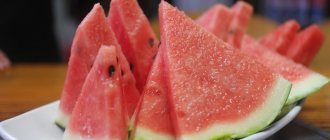Every nursing mother worries about her diet. After all, the health of the baby depends on nutrition, which through breast milk receives elements of the food that the mother ate. In addition, the right menu will help you recover faster after childbirth, replenish the lack of vitamins and return to your previous figure.
A strict diet is only needed in the first two months after the birth of a child. Over time, the newborn’s body adapts and gets used to new food, which allows the nursing mother to gradually add foods to the diet. In this case, be sure to check whether the food causes allergies or severe colic in the baby.
Avoid excessively salty, fried, fatty and spicy foods, as they overload the newborn's digestion and cause intestinal disorders. However, many of the favorite foods can be consumed by a nursing mother, but in limited quantities. When breastfeeding, the main thing is to observe moderation and not overeat!
Eggplants during lactation: possible or not
What foods a nursing mother can eat and when, read in detail in the section “Nutrition after childbirth.” Note that nutritionists and pediatricians do not recommend eating colored vegetables during lactation due to the content of a strong allergen (carotene). These vegetables also include eggplants with a juicy blue color.
However, eggplants contain a lot of vitamins and nutrients. They stimulate the functioning of the heart, blood vessels and muscles. The product is necessary for the mother for quick recovery, and for the baby for full growth and development.
Eggplants during breastfeeding are a real source of strength, energy and vigor. Therefore, you should not give up colored vegetables. In addition, they are easily absorbed by the body, especially when boiled. The main thing is not to abuse it!
Useful features
- Ensure normal functioning of the heart and prevent anemia;
- Stimulates intestinal function and digestion;
- Prevents decay processes in the body;
- Normalizes hematopoiesis. Eggplants will help a nursing mother and a baby with anemia;
- Have a beneficial effect on the activity of the liver and kidneys;
- They improve metabolism, which is especially necessary for newborns;
- Helps with constipation. If a nursing mother has constipation, dried fruits, boiled carrots and beets, fennel decoctions and drinking plenty of fluids will also help;
- Constipation in a newborn will also be cured;
- Resist the occurrence of diabetes and gout;
- Strengthen the immune system, protect against viruses and colds.
Contraindications for use
Eggplants contain oxalates, the accumulation and crystallization of which lead to health problems for a nursing mother. The first blow is taken by the kidneys and gall bladder. In addition, oxalates interfere with the normal absorption of calcium.
Patients with:
- Severe pathologies of the kidneys and liver.
- Gastritis, peptic ulcer of the stomach and duodenum.
- Inflammation of the pancreas.
- Tendency to diarrhea.
- Arthrosis.
- Gouty arthritis.
Diabetics and those on insulin therapy should consume eggplant with caution. They contain very few carbohydrates; excessive consumption of the product threatens hypoglycemia. Eggplants will harm people with fiber intolerance, including hereditary ones. Vegetables can be included in children's diets from the age of 3 years.
Ingredients: vitamins and beneficial elements
| Substances | Effect on the body | Contents per 100 g of product |
| B-carotene (Beta-carotene) | Increases resistance to stress, helps adapt and strengthens the immune system, but is an allergen | 0.03 mg |
| A (retinol) | Preserves and improves visual acuity, restores skin and heals wounds, strengthens bones | 3.1 mcg |
| B1 (thiamine) | Ensures normal metabolism in the body, improves memory and attention, stimulates brain function, improves mood and appetite | 0.04 mg (3.75% DV) |
| B2 (riboflavin) | Improves the condition of the skin, nails and hair, normalizes the functioning of the thyroid gland | 0.05 mg |
| B5 (pantothenic acid) | Improves kidney function and stimulates brain activity, helps with allergies, arthritis and heart disease | 0.3 mg (6% DV) |
| B6 (pyridoxine) | Prevents nervous disorders, spasms and skin diseases, slows down aging | 0.3 mg (4% DV) |
| B9 (folic acid) | Forms cells, supports the functioning of blood vessels and the heart, improves hematopoiesis | 18.6 mcg (5.5% DV) |
| C (ascorbic acid) | Forms and improves immunity, prevents colds and infections, heals wounds, gives vigor and energy | 5.4 mg |
| E (tocopherol) | Nourishes cells and slows down aging, stabilizes hormonal levels and improves reproductive functions, reduces the risk of cancer | 0.14 mg |
| PP (niacin) | Dilates blood vessels and produces energy, normalizes the functioning of the heart and nerve cells | 0.6 mg |
| Calcium | Forms and strengthens the bone skeleton, tooth enamel, improves blood clotting | 15 mg |
| Potassium | Regulates water balance, normalizes heart rate, supplies oxygen to brain cells | 238 mg |
| Magnesium | Ensures normal functioning of muscles and nerves, maintains healthy teeth, removes toxins from the body | 9 mg |
| Sodium | Supports water-salt metabolism and acid-base balance, dilates blood vessels | 6 mg |
| Iron | Participates in the formation of hemoglobin in the blood, ensures material metabolism, protects against harmful bacteria | 0.4 mg |
| Phosphorus | Ensures muscle function, teeth and bone growth, improves memory and brain function | 34 mg |
| Manganese | Regulates glucose levels, reduces sugar and cholesterol levels, prevents the development of diabetes mellitus | 210 mcg |
| Copper | Helps cope with stress, participates in skin and hair pigmentation | 135 mcg |
| Molybdenum | Ensures tissue respiration, improves blood composition, prevents diabetes and gout | 10 mcg |
| Zinc | Forms bone tissue, prevents the development of epilepsy and diabetes, rheumatism and arthritis, improves skin elasticity and hair condition | 290 mcg |
| Fluorine | Strengthens bones and teeth, improves immunity, ensures hematopoiesis, hair and nail growth, prevents osteoporosis and caries | 14 mcg |
Eggplants on the children's menu
"Blue" ones are not considered a dangerous product for children. All the beneficial components of the purple vegetable are involved in the proper formation of the child’s body. Eggplants are loaded with thiamine, pantothenic and folate acids, niacin and phytonutrients. The listed components are very useful for the growing body of a child. The composition of the fruit has a positive effect on the circulatory system and heart function. Systematic consumption of “blues” in food helps normalize hemoglobin and cholesterol levels.
Important! It is better to choose young fruits without external damage; in overripe ones the solanine content is much higher. Before cooking, be sure to soak the eggplants in salted water for about 40 minutes.
Despite the obvious benefits, the opinion of pediatricians is still divided into two camps. Some argue that eggplants should not be included in the diet of a child under three years of age, since this low-calorie product is not able to replenish the child’s energy. Others, on the contrary, advise introducing vegetables into complementary foods from 8-9 months. The baby needs a variety of foods rich in healthy elements.
Rules for use during breastfeeding
- Introduce eggplants to the menu no earlier than 3-4 months after the baby is born;
- If your mother ate eggplants during pregnancy, you can start eating the vegetable as early as 2-3 months;
- For the first time, eat a small piece of boiled or stewed vegetable in the morning and monitor the baby’s well-being for two days. If there are no allergies or stomach upsets, you can gradually increase the dose;
- If you have a negative reaction, delay taking the new food. You can try the product again at least 3-4 weeks after the first try;
- Do not try several new foods at the same time in order to know exactly which food has which reaction;
- Don't overeat. The daily norm for breastfeeding is 100 grams, and the weekly norm is 300;
- It is better to eat boiled, baked and stewed vegetables. They are easier to digest and not as greasy as when fried;
- When cooking, you can use sunflower or olive oil, and season the finished dish with low-fat sour cream;
- Eggplants quickly absorb oil and become greasy. To avoid excess fat, before preparing the dish, cut the eggplant into circles or pieces and immerse in cold water for 10 minutes;
- Wash and select vegetables thoroughly. Use young eggplants as they are less bitter. Fruits should not contain dots or spots.
What harm can occur from eating eggplants?
Sometimes eggplants consumed by a nursing mother can harm the baby. The reaction is often caused by instability of the baby’s digestive organs; reactions occur when the woman does not comply with the rules of administration. For example, the risk of side effects in a baby increases if the mother uses fried vegetables. This feature is associated with an increased content of carcinogens and other harmful compounds. Symptoms occur in the form of active flatulence, bloating or diarrhea. No special correction is required; the reaction disappears on its own after 1-3 days.
Dishes with eggplants
A suitable dish for breastfeeding is vegetable stew or puree. For cooking, in addition to eggplants, you can take carrots, potatoes and zucchini. By the way, zucchini is the safest vegetable that a nursing mother can eat in the first weeks after giving birth. In addition, zucchini contains complete nutritional and regenerating elements.
When stewing, cut vegetables into small cubes. This way they will cook faster and retain their beneficial properties. You can add a little salt, onions and herbs to the stew or puree, but it is better to avoid pepper, garlic and hot spices. A nursing mother can take garlic for 5-7 months of breastfeeding.
A tasty and safe dish is eggplant caviar.
To prepare, take:
- Onions – 1 medium head;
- Carrots – 2 medium pieces;
- Eggplant – 2-3 pieces;
- Salt;
- Vegetable oil;
- Greenery.
Finely chop the vegetables into cubes. First fry the onion, then add carrots and eggplant, salt and add herbs. Parsley or dill are suitable for a nursing mother; they rarely cause allergies and have a positive effect on lactation. Simmer after frying the onion for 20-30 minutes. You can take eggplant half with zucchini, then you will get delicious, rich caviar! Read how to cook squash caviar here.
The Greek eggplant moussaka casserole also diversifies the menu.
Due to the large number of ingredients and sufficient fat content, it is better to add this dish to the diet no earlier than 4-5 months after birth. To prepare, take:
- Onions – 1 medium head;
- Minced meat – 300 grams. When breastfeeding, choose low-fat minced meat. Chicken or beef will do;
- Tomato – 1 piece. It is better for a nursing mother to take yellow tomatoes, as they reduce the risk of allergies;
- Potatoes – 3 medium tubers;
- Eggplant – 1 large or 2 medium pieces;
- Milk – 300 grams;
- Eggs – 2 pieces. If your baby is allergic, you can use quail eggs;
- Greens and salt;
- Vegetable oil.
Fry the onion and minced meat in a small amount of oil until the minced meat turns a reddish color. Add diced potatoes, eggplant and tomato. Simmer for 5-10 minutes. Beat the eggs, add milk, salt and herbs, mix. Place the vegetable mixture with minced meat in a baking dish and fill with milk liquid. Bake for 15 minutes at medium temperature. The casserole can be sprinkled with grated cheese before cooking. It is better for a nursing mother to choose pickled cheeses (Adyghe, feta or feta cheese).
Find out what other vegetables you can eat while breastfeeding at the link /.
Subscribe to our VKontakte group
Delicious recipes for a nursing mother
To prepare delicious dishes from such a magnificent vegetable, it is better to select young fruits, because they are less bitter.
Advice!
To remove bitterness, you need to cut the fruit into pieces (before starting cooking), sprinkle with salt and leave for 5-10 minutes.
Vegetable stew with eggplant
Vegetable stew is a quick dish rich in vitamins necessary for both the baby and the breastfeeding mother.
Ingredients:
- eggplant;
- onion head;
- carrot;
- several potatoes;
- salt;
- 2 tablespoons of vegetable oil;
- dill.
Preparation
Vegetables, except eggplant, are peeled and cut into medium cubes. Place eggplants in a hot frying pan with vegetable oil, after 15 minutes add onions and carrots, fry for 5 minutes, add potatoes. Add half a glass of water and cover with a lid. Stew until cooked, bring to taste and add finely chopped dill at the end.
Baked boats for a nursing mother
This dish does not require much effort and a lot of time.
Ingredients:
- several pieces of eggplant;
- half a glass of walnuts (chopped);
- low-fat sour cream;
- cheese (hard);
- salt.
Preparation
The eggplants are washed and cut lengthwise (it is better to use small vegetables). Cut out the middle so that you get boats. The pulp is crushed into small cubes and mixed with walnuts and salt. Fill the empty boat with this mixture, place it on a baking sheet, add water and place it in the oven.
After the boats have become soft, take them out and put a tablespoon of sour cream and a piece of cheese on top. Place it in the oven again and bake it. When serving, you can decorate with sprigs of greenery.
Additional Precautions
- You can only buy the product in specially designated places. It is best to avoid purchasing a product that has been left in the sun for a long time.
- The vegetable should have a pleasant appearance. It is best to opt for a whole and fresh product. It should not have a damaged structure.
- It is necessary to rinse it thoroughly before eating.
- Eggplants can taste bitter. To eliminate this unpleasant manifestation, you should cut them in advance and sprinkle with salt. You can also soak them in water for twenty minutes.
The fruits contain large amounts of solanine. Previously it was believed that this component negatively affects the condition and body of the child. However, such a statement is considered incorrect. Its negative effects can only cause heartburn in mommy. In order to avoid such a negative situation, you should buy only young fruits.
Eggplant stew
The fried version of the dish also causes a lot of controversy among breastfeeding experts. It is not allowed to use a large amount of oil during frying. Before and after the process, the fruits are soaked in cold water. Thanks to this, it is possible to reduce the fat content by half.
Mommy can eat blue ones in any form and quantity. Stewed eggplants will have a positive effect on a woman’s body. You can treat yourself to a stew that contains blueberries as an ingredient.
To maintain the health of mother and child, you should eat enough vegetables, walk a lot in the fresh air and not be nervous.
What vegetables can a nursing woman eat and in what types?
- Potato. You can eat it in any form, except fried or fried.
- Cauliflower. It is allowed if it is steamed.
- Carrot. Use very carefully and in small portions so as not to cause allergies.
- Beet. It is possible if the baby does not react to it.
- White cabbage. It is better to avoid it; it promotes excessive gas formation. It is advisable to exclude dishes and recipes for nursing that contain it from the diet.
- Cucumbers, zucchini. The list allows a nursing mother to include them in her diet. These products extremely rarely cause allergies and do not affect the digestive process in any way.
- Tomato, bell pepper and eggplant. It is advisable to introduce it into the diet of a nursing mother at first with caution, observing the baby’s reaction. Each of the listed vegetables should be introduced every 3 days.
To make it easier for every breastfeeding mother to navigate the variety of vegetables and remember what can and cannot be eaten, we will present a kind of “vegetable traffic light”.
Red vegetables are prohibited in principle. They contain allergens and pose a danger to the child's health. In addition to tomatoes, they can be introduced into the diet, but very carefully: once every 3 days, strictly monitoring the baby’s reaction.
Yellow vegetables are possible, but with caution. A little earlier, pediatricians completely recommended excluding vegetables and fruits of this color from the diet when breastfeeding. Today there is a different opinion, according to pediatricians, some of them are even desirable during this period. However, they must be introduced into the diet extremely carefully and in small portions. If there are not too many of them in mother's milk, this will not lead to stool disorders and bloating.
Green vegetables can be eaten without fear. All vegetables and fruits included in this color shade can be safely eaten. Except for white cabbage.
How to choose?
During lactation, only young eggplants without visible damage (spots/black spots) can be consumed. Overripe and rotten brownish fruits accumulate a lot of solanine, a poisonous alkaloid that is destroyed when frying and soaking in salted water. It is not advisable to eat fried/salted fruits while breastfeeding.
Breastfeeding experts recommend that mothers peel blue vegetables, as toxic substances also accumulate there.
Preference should be given to eggplants grown in the home garden without fertilizers and chemicals or purchased at the market from familiar private traders during their ripening period. You can freeze the product for future use and use it all year round. Breastfeeding women should choose small white/light purple fruits.
Blue vegetables should not be eaten raw/undercooked or fried. When frying, a large amount of fat accumulates in them, which is harmful to mother and baby. Grilled/oven-baked or steamed vegetables are preferred. Prepared in this way, they retain their beneficial properties as much as possible. Freshly prepared eggplant caviar is allowed. But it’s better to say no to canned (pickled) fruits, since the vinegar contained there can upset digestion.
It is not recommended to eat pickled eggplants: they contain vinegar, which negatively affects the digestive system of the expectant mother.
Use during pregnancy
Eggplant for pregnant women is one of the important foods in the diet. By eating it, the expectant mother receives microelements such as iron and potassium, which are involved in the formation of the fetus. The potassium contained in dark nightshade will be indispensable in the mother’s diet if she suffers from diabetes, kidney problems or heart weakness. This element normalizes and strengthens the functioning of internal organs.
During pregnancy, nightshade juice is used as the first antimicrobial agent to promote rapid wound healing.
During pregnancy, eggplants saturate a woman’s body with vitamin B9, folic acid, which is important for the full bearing of a child. And the fiber present in it helps to cope with swelling, because it removes excess fluid from the body. It also normalizes the acid-base balance of the body.
The optimal period for consuming vegetables is the second trimester of pregnancy.
Possible problems
Due to the presence of poisonous solanine in eggplants, they were called “crazy apples” until the 19th century. Europeans claimed that dishes prepared from these strange-looking fruits drove a person crazy. When breastfeeding, only young eggplants are allowed to be eaten! You should not eat overripe fruits, as the glycoalkaloid accumulated in them can cause severe poisoning. Symptoms of eggplant poisoning include:
- Dyspeptic symptoms (nausea, vomiting, heartburn).
- Cramps.
- Shortness of breath.
- Abdominal colic of varying intensity.
If a young mother is poisoned by overripe eggplants, she must adhere to a strict diet for the next 2–5 days. Feeding the child should be stopped during the period of restoration of normal functioning of the stomach and intestines. The damage caused by overripe vegetables can be eliminated by drinking plenty of milk, and it will become much easier if you drink 1-3 raw egg whites on an empty stomach. In severe cases, they resort to gastric lavage and taking absorbent drugs.
To avoid purchasing overripe eggplants, pay attention to the stalk; it should be green and look fresh. If the skin of the fruit is slippery, covered with dark brown spots or dots, pass by. Young eggplants have less bitterness
During lactation, give preference to white varieties. The hybrids contain extremely little solanine, and their taste is in no way inferior to their purple “brothers.”
Young eggplants have less bitterness. During lactation, give preference to white varieties. The hybrids contain extremely little solanine, and their taste is in no way inferior to their purple “brothers”.











